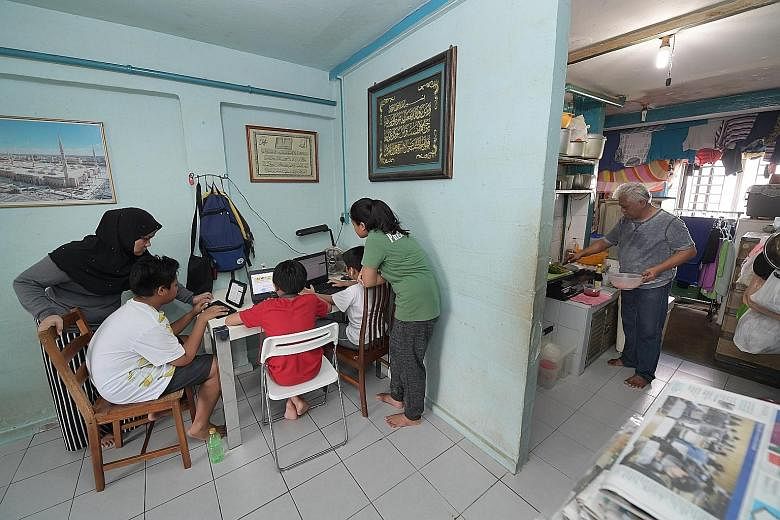A 14-year-old boy is sitting cross-legged on the floor, looking at his tablet loaned from school. A nine-year-old is sprawled on his belly, doing his homework on the floor.
Their other two siblings, a girl aged 12 and a boy aged 11, are seated at a small table against the wall in the two-room rental flat, doing their home-based learning (HBL).
The four children share three devices among them for HBL. The family have a laptop which they bought at a subsidised rate through a government scheme for lowincome households. They also have a laptop and a tablet, both on loan from school for HBL.
While the three devices are sufficient for the children's HBL needs, which include hard-copy worksheets and online assignments, the family, which do not have a household Wi-Fi subscription, have problems with connectivity.
The children's mother, Madam Salmiah Salam, 37, uses a dongle, donated by a charity, to turn her smartphone into a Wi-Fi hot spot, but it is not working properly. The patchy Internet access means online work for HBL slows from time to time.
The housewife, who left school after the N levels, is finding HBL stressful.
She says: "I have to teach my children. If they don't understand the work, I have to explain it to them. But sometimes I myself don't understand the concept. I go to YouTube to find out more."
She has been refreshing her knowledge of factors and multiples alongside her youngest child, Muhammad Hadiputra Hashim, who is in Primary 4.
She says: "I wish my kids had a more conducive study environment. Then at least they can be more engaged learners. But we lack space, so we make do with what we have."
The family's sparsely furnished rental flat in Redhill comprises a hall, a kitchen and a bedroom. They usually have dinner together on the floor in the hall.
During this period when schools are closed and the afternoons stretch lazily, the children have been taking more naps than usual on pillows strewn on the floor.
Another source of stress for Madam Salmiah and her 56-year-old husband is that he is out of work.
Mr Hashim Kamid, the sole breadwinner, quit his job as a cleaner at a condominium at the end of February. He feared bringing the coronavirus into his home after a day of cleaning lifts and other surfaces.
A few years ago, after his operation for an infected stomach ulcer, his doctor had also advised the former rubbish collector to work in a more hygienic environment.
He was earning about $1,100 a month. Ms Salmiah has been taking her few pieces of jewellery to the pawnshop in the past month.
"We have done this before. Hashim was retrenched when the children were younger," she says.
She was too "paiseh" (Hokkien for embarrassed) to ask for help. But Beyond Social Services, which has supported the family before, asked if she needed assistance during the Covid-19 outbreak.
The charity, which serves lowincome families, has provided her with $150 for groceries and is processing more financial aid for the family.
The Solidarity Payment, a $600 cash payout for adult Singaporeans to cope with the pandemic, has also eased her burden, she says.
The couple hope normalcy will return soon and that Mr Hashim finds another job.
In the meantime, they try to find some light-heartedness in the situation.
Mr Hashim, who has been cooking more, is not used to being around his children 24/7. He recently asked his wife how she could "tahan" (Malay for tolerate) being with the kids all day long.


